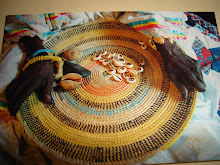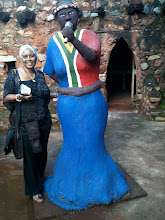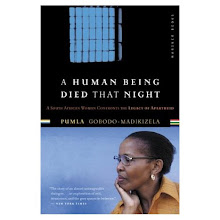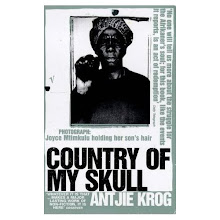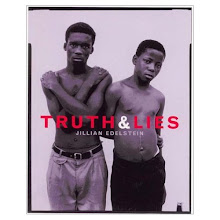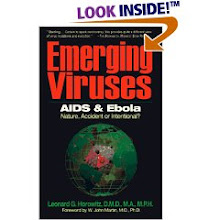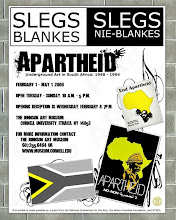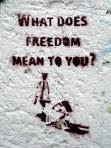
Sanibona
I ended the last blog with the price that people of colour and especially black people had to pay for their freedom in South Africa and I say black because, as I was reminded by a white woman from Africa "we" she exclaimed " are also Africans!" Of course that is a true fact. Although, were it to be so simple, we would not have had Aparthied. Were it to be so clear or true then we would all be seen as Africans, rather than racially segregrated by the colour of our skin and we would all live with Ubuntu. The people would not have been ALIENS in their homeland.
The Freedom Charter is a blue print for a future South Africa and it was declared at the Congress of the people in Kliptown, South Africa on June 26, 1955. It was a direct result of the harsh injustices to oppress Africans of Colour in South Africa and it contained 10 clauses. It is a collection of the people's collective expression and wisdom. When I first read it the first thought that struck me was that the black or coloured people who were born and lived in South Africa had to write a Freedom Charter in order to feel safe in their own land, in order to belong in their own land, in order to live, work be educated and die in peace in their own land.
My story goes that my eldest brother had asked my mother one day why he could not sit on a bench at the bus stop. It was after that incident (as well as many others) that we decided in 1954 to sell our land and my father and his mother in law left to search for a more humane life in London. My father was the only boy in his family and I now know that his having to leave his family (mother father and sisters, and his homeland) must have been a very hard decision to make. But as a principal in an Eastern Cape school as I was recently told, he wanted for us what he wanted for all his pupils - potential and possibility and he believed that we could get this from education and so we joined him in London in 1954. I recently spoke to an old friend of the family in South Africa and she shared that my father was loved by his pupils because he believed in each and everyone of them, it warmed my heart so much to hear this. I am discovering through stories that I am very much like him.
I am deeply grateful to my parents for the sacrifices they had to make for us and all those who come after me and my brothers, so that we may live freely with a free spirit. My immediate famliy live in London and are thriving with their own mixed marriages and beautiful children and grandchildren. My own journey home, I believe has begun to reawaken me from a deep sleep about knowing the truth of what happened. I am thrilled to be able to bring back more stories from a family I have discovered in Africa.
When I read the Freedom Charter which was written fifty one years ago, I am deeply saddened that South Africa is still a long way from being free and that the wound of Apartheid and the divisions that still exist are as deep as the San Andreas Fault. I can only live in hope that this tragically beautiful land can be recovered and uplifted and returned to those who have been and are still homeless in their homeland. That said I am deeply grateful to my parents for their courage and the sacrficies they had to make for us and all those who came after. Now at least I can return as a citizen, not as an alien in the motherland. Hopefully I can give back in some small way to those who stayed and worked and struggled for freedom from apartheid. It is to those gentle warriors, who who gave their lives that we may be free that I owe my deep gratitude.
Preamble
WE, the people of South Africa declare for all our country and the world to know:
That South Africa belongs to all who live in it, black and white, and that no government can justly claim authority unless it is based on the will of the people:That our people have been robbed of ther birthright to land, liberty and peace by a form of government founded on injustice and inequality;That our country will never be prosperous or free until all the peoplelive in brotherhood, enjoying equal rights and opportunities; That only a democratic state, based on the will of the people can secure to all their birthright without distinction of colour, race, sex or belief; And therefore, we the people of South Africa, black and white together -equals, countrymen and brothers -adopt this Freedom Charter. And we pledge ourselves to strive together, sparing nothing our strength and courage, until the democratic changes here set out have been won.
The People shall Govern!
Every man and woman shall have the right to vote for and stand as a candidate for all bodies which make laws;All the people shall be entitled to take part in the administration of the Country;The rights of the people shall be the same regardless of race, colour, or sex; All bodies of minority rule, advisory boards, councils and authorities shall be replaced by democratic organs of self- government.
All National Groups Shall have Equal Rights!
There shall be equal status in the bodies of state, in the courts, and in the schools, for all national groups and races; All people shall have equal rghts to use their own language and to develop their own folk culture or customs; All national groups shall be protected by law against insults to their race and national pride; The preaching and practice of national, race or colour discrimination and contempt shall be a punishable crime; All apartheid laws and practices shall be set aside.
The People Shall Share in the Countries Wealth!
The National wealth of our country, the heritage of all South Africans shall be restored to the people;The mineral wealth beneath the soil, the banks and monopoly industry shall be transferred to the ownership of the people as a whole; All other industries and trade shall be controlled to assist the well-being of the people; All people shall have equal rights to trade where they choose, to manufacture and to enter all trades, crafts and professions.
The Land Shall be Shared Among Those who Work It!
Restrictions of land ownership on a racial basis shall be ended, and all the land re-divided amongst those who work for it, to banish famine and and hunger. The state shall help the peasants with implements, seed, tractors and dams to save the soil and assist the tillers;
Freedom of movement shall be guaranteed to all who work on the land; All shall have the right to occupy land wherever they chose; People shall not be robbed of their cattle, and forced labour and farm prisons shall be abolished.
All Shall be Equal Before the Law!
No one shall be imprisoned, deported or restricted without a fair trial; No one shall be condemned by the order of any government official; The courts shall be representatives of all the people; Imprisonment shall be only for serious crime against the people, and shall aim at re-education, not vengeance; All laws which discriminate on grounds of race, colour or belief shall be repealed.
All Shall Enjoy Equal Human Rights!
The laws shall guarantee to all their right to speak, to organize, to meet together, to publish, to preach, toworship and to educate their children; The privacy of the house from police raids shall be protected by the law; All shall be free to travel without restriction from country side to town, from province to province, and from South Africa abroad;Pass laws, permits and all other laws restricting these freedoms shall be abolished.
There Shall be Work and Security!
All who work shall be free to form trade unions, to elect their officers and make wage agreements with their employers; The state shall recognize the right and duty of all to work and to draw full unemployment benefits; Men and Women of all races shall receive equal pay for equal work; There shall be a fourty hour working week, a national minimumm wage, paid annual leave, and sick leave for all workers, and maternity leave on full domestic workers and civil servants shall have the same rights as all others who work;Child labour, compound labour, the tot system and contract labour shall be abolished.
The Doors of Learning and Culture Shall be Opened!
The government shall discover, develop and encourage national talent for the enhancement of our cultural life; All the cultural treasures of mankind shall be open to all, by free exchange of books, ideas and contact with other lands; The aim of education shall be to teach the youth to love their people and their culture, to honor human brotherhood, liberty and peace; Education shall be free, compulsory, universal and equal for all children; Higher education and technical training shall be opened to all by means of state allowances and scholarships awarded on the basis of merit; Adult illiteracy shall be ended by a mass state education plan; Teachers shall have all the rights of other citizens; The colour bar in cultural life, in sport and in education shall be abolished.
There Shall be Houses, Security and Comfort!
All people shall have the right to live where they choose, to be decently housed and to bring up their families in comfort and secuirity; Unused housing space to be made available to the people; Rent and prices shall be lowered, food plentiful and no one shall go hungry; A preventive health scheme shall be run by the state; Free medical care and hospitalization shall be provided for all, with special care for mothers and young children; Slums shall be demolished, and new suburbs built where all have transport, roads, lighting, playing fields, creches and social centers;The aged, the orphans, the disabled and the sick shall be cared for by the state; Rest, leisure and recreation shall be the right of all; Fenced locations and ghettos shall be abolished, and laws which break -up families shall be repealed.
There Shall be Peace and Friendship
South Africa shall be a full independent state which respects the rights and sovereignty of all nations; South Africa shall strive to maintain world peace and the settlement of al international disputes by negotiation-not war; Peace and friendship amongst all our people shall be secured by upholding the equal rights, opportunities and status of all; The people of the protectorates- Basutoland, Bechuanaland, Swaziland shall be free to decide for themselves their own future; The right of all people of Africa to independence and self-goverment shall be recognized, and shall be the basis of close cooperation.
Let all who love their people and their country now say, as we say here:
"THESE FREEDOMS WE WILL FIGHT FOR, SIDE BY SIDE THROUGHOUT OUR LIVES, UNTIL WE HAVE WON OUR LIBERTY.
 I awoke this Thanksgiving morning with the song of Wimoweh in my head. And I wanted to say thank you (Ngiyabonga) to one of my heroines. As a child I will always remember hearing Miriam Makeba songs in our household. It was our family's connection to South Africa, when we moved to London in 1954. Just five years later in 1959, at the age of 27, Makeba's passport was revoked for criticizing apartheid, she was banned from returning home, and did not see South Africa for the next 30 years. Described as "our own nut brown baby" by the Manhattan Brothers and having the voice of a "nightingale" Makeba not only brought to her work a presence of deep soul, passion and a unique brand of music but she never forgot the struggle of her people in South Africa, often using her songs to tell the story.
I awoke this Thanksgiving morning with the song of Wimoweh in my head. And I wanted to say thank you (Ngiyabonga) to one of my heroines. As a child I will always remember hearing Miriam Makeba songs in our household. It was our family's connection to South Africa, when we moved to London in 1954. Just five years later in 1959, at the age of 27, Makeba's passport was revoked for criticizing apartheid, she was banned from returning home, and did not see South Africa for the next 30 years. Described as "our own nut brown baby" by the Manhattan Brothers and having the voice of a "nightingale" Makeba not only brought to her work a presence of deep soul, passion and a unique brand of music but she never forgot the struggle of her people in South Africa, often using her songs to tell the story. 









